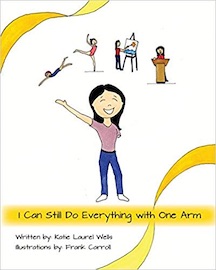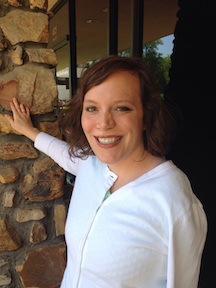By Alexis Sargent
Katie Laurel Wells (ΦBK, The University of the South) recently published her first children’s book, I Can Still Do Everything with One Arm. Based on Wells’ own story of overcoming the challenges of having been born with one arm, the book chronicles the many instances when she was told she was unable to do something due to her disability, but often triumphed and defied the odds she was presented with.
“I was born with one arm,” she writes in the beginning of the book. “I thought God was too tired to finish making me, but then I learned we all have differences and those differences are the greatest gift in this world. God makes us all different because that’s how special we are.”
At Wells’ first swim lesson, the instructor told her that she would never be able to swim due to her disability. Wells’ mother persisted and eventually found a swim coach for her daughter. Wells has thrived in natatoriums ever since. As a child in local competitions, she repeatedly swam faster times than the other swimmers in her age group who had both arms. She also competed on the U.S. National Paralympics Swimming Team.
Because of these interactions, and many others along the way, Wells wanted to create a book that could not only help children with disabilities, but also help those without disabilities understand appropriate responses when encountering individuals who are different. She believes fostering awareness of people with disabilities in young children is very important. Writing the book created a platform for Wells to better speak with children and provide a concrete example of how to positively perceive individuals with disabilities.

Wells serves as an inspiration to many and periodically visits elementary school classrooms with both her story and her book. When providing motivating talks to students, she describes how important it is for them to receive visual examples and be actively involved in the discussion. “When I give talks to students, I try to make them interactive,” Wells explains. “I will show them how I can paint my fingernails or open up a bag of potato chips using my left foot.”
“I wanted to create a children’s book that was educational and also encouraging,” Wells says. She credits many individuals as positively guiding her life, including Fred Rogers from the hit PBS television show. At the age of four, Wells remembers very clearly watching “Mister Rogers’ Neighborhood” and hearing his message of how special she was.
In high school, Wells reached out to Rogers via a letter telling him about the difficulties she faced and how his show had helped her through some of her hardships. Rogers replied, especially taking an interest in her swimming competitions, encouraging her and celebrating her victories. “We ended up being pen pals for years and years. I probably have about 23 or so letters from Mr. Rogers,” Wells says. “I remember in one of his letters he said to me that I am so much more than just my one arm, and that message really meant a lot to me.”
Wells graduated in 2005 with highest honors from The University of the South, where she was inducted into Phi Beta Kappa. She describes joining Phi Beta Kappa as an important moment of intellectual achievement. “It was a very special honor to me because of how prestigious the honor is,” she recalls. “With Phi Beta Kappa being the oldest academic society, it was very exciting for me to be inducted.”
Wells believes that I Can Still Do Everything with One Arm may be the first in a series. She is brainstorming other ideas, and some thoughts include her experience navigating Washington, D.C., public transit with one arm when she was a White House intern and describing to others the little ways they can help people with disabilities.
I Can Still Do Everything with One Arm is dedicated “to all those with disabilities who have constantly been told they can’t, only to realize they can.”
Alexis Sargent is a senior at Michigan State University studying social and public policy. She was inducted into Phi Beta Kappa in spring 2018, during her junior year. Michigan State University is home to the Epsilon of Michigan chapter of Phi Beta Kappa.




